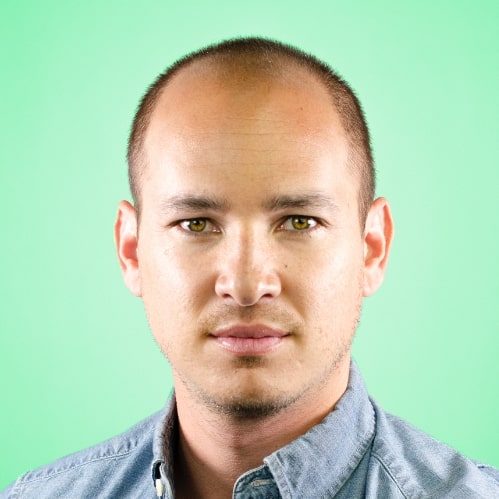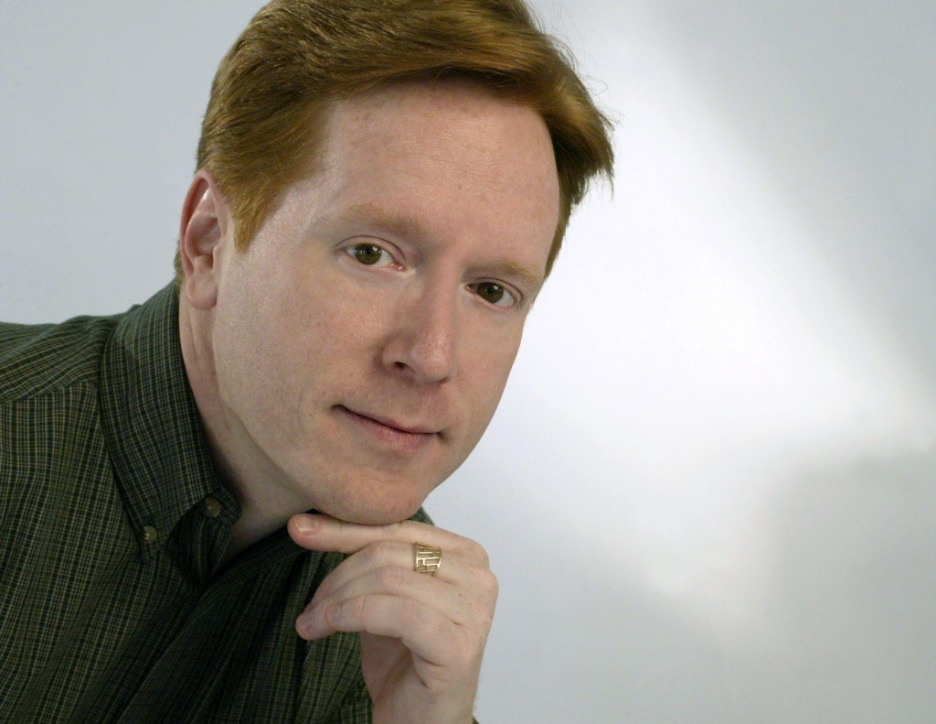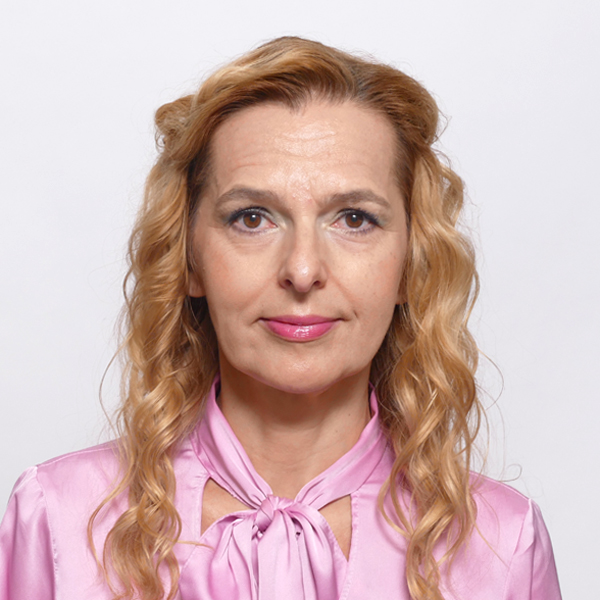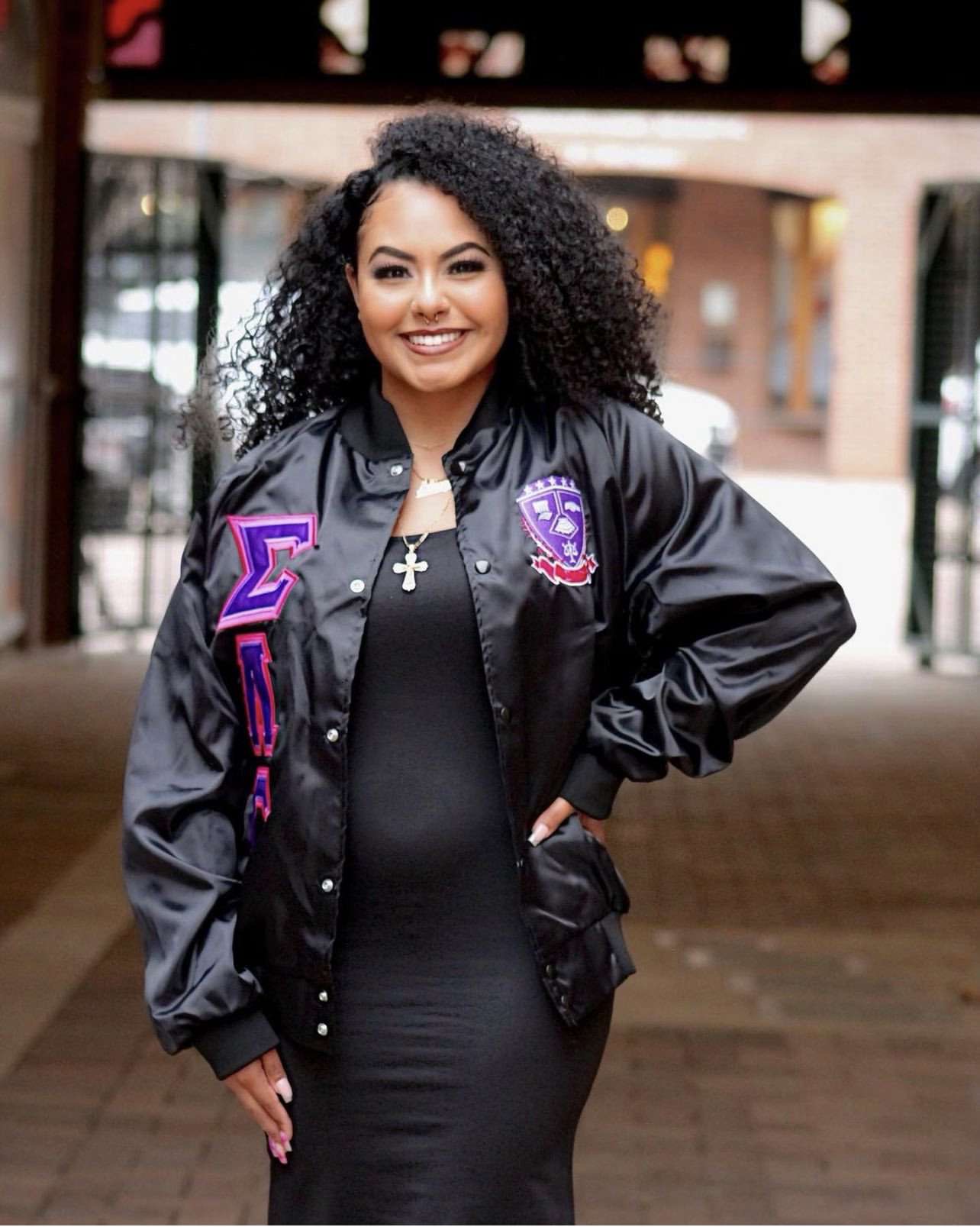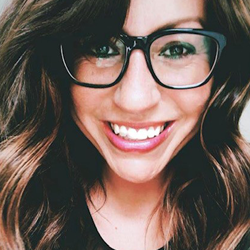
Graduate student and military veteran, Katy LaFary, shares her unique story about finding UNC while serving in the United States Air Force.
My name is Katy LaFary and I am a graduate student in educational psychology.
And we are talking about two things here. Psychology and military. Should I just say military?
That's fine.
Okay. How about we start off with a little history.
Okay. I think it's easier to start with the military side of me. It's funny, I think as an introduction, oftentimes people ask you, we associate, and especially in the United States, what do you do for a living? And oftentimes, I don't know how to answer that. What are you? Who are you? how do you answer that when there's many aspects to you? I asked my mom not that long ago if my many many interests ever, like how that was raising a child that had so many interests. And she said, 'I used to be concerned for a very long time and then I realized that it's just who you are and it's what gives you, what would exhaust most people, gives you energy.'.
You feed off of that.
Yeah. Yeah. So that kind of starts my path. When I was a junior in high school, I was asked to write a paper about what I wanted to do when I was older. And I had thought many things when growing up from a young age, I wanted to be independent and I just didn't, my parents did so much for us growing up that I was like, I can't ask them to pay for my college, pay for my apartment, pay for my car. I needed more independence than that. They raised me to be so independent.
I very distinctly remember we had to go to computer lab cause I'm old and that's what you used to have to do back in the day.
With the clicky keyboards.
Yes. And I mean the big like computer, the big apples, you know. And we were sitting there and I was like, I don't know what I'm supposed to write about. I don't know cause I haven't thought about this yet. And there was a magazine, it was Air Force Times... It was some military magazine and there was a woman on the cover. She was standing in front of a fighter, I think it was F-15. And she looked like such a badass. I mean, she looked powerful. I think she was an F-15 pilot F-16 pilot. I'm not sure. I've never done fighters. And I was just like, I want to be like her. I've always wanted to do things that weren't typical of women, maybe. And I don't think I always thought about it like that, but looking back, I think that's what it was like. I just wanted to challenge myself. And I think unfortunately a lot of times when you think of when as a person I was thinking of ways to challenge myself, it wasn't a typical road that many women went down. So I wrote and I said that I wanted to go into the air force Academy, be a cadet and then move forward with, I never wanted to fly so I didn't want to be a pilot, but that was my first time deciding I wanted to go into the military apparently.
So you saw the independent Katy in you from your junior year in high school from a magazine cover. Do you contribute that as the catalyst?
I mean that's the whole like what came first thing. I know obviously my personality and my drive and all that stuff came first. But I think that probably was one of those moments that it did, it was probably the catalyst. Well I definitely, it's like I was in a fork and I didn't even realize I was, but everyone was asking, what are you going to do after high school? What are you doing after high school? And I don't like pressure. I like to get my own path.
So you went down this path.
So, and then I decided after doing more research with that paper, actually I did not want to be an officer. I wanted to be enlisted. In the Academy, you come out of it being an officer and, oftentimes you would be a pilot or somebody in the aircraft and that's also not my interest. I mean, you can do other things, but that's like one of the main focuses. And I was just like, you know, that's not me. Like I want to work really hard. Like I, I'm not saying officers don't work hard for those that are listening. It's just very different. They're looked at as the leadership and especially throughout time, like officers, those are the ones that make the decisions. They're the one, you know, but all I could visualize was sitting in meetings and, and not really like getting into like...
More paperwork, less in the field.
I wanted to be. And I've always been very extroverted and a people person. So that's what I needed in my life. So fast forward my senior year I took the ASFAB and I did the delayed enlistment program. And then right out of high school I came in active duty air force. It was before September 11th. And so I, my family has always been very supportive of any decision I make and they do not put how they feel about things on me. But you don't always have to things for you to understand that it's, you know, they're proud or they're scared or they're concerned or this or that. And, there was just a lot of, not from my family per se, but maybe from, you know, I grew up middle class people did not go in the military in the middle class back then. Now it's much more common. It's been much more common sense the economy fell. But before September 11th, if you were going in the military, oftentimes I've done research on this so I can speak from my from my research at least that a lot of times people were using it cause they were lower SES and they needed to get away from their (life), you know, and have a better life for them and all that stuff.
And that was not my situation. I have a very healthy family and I love my friends and all that stuff, but I just needed to explore and go out on my own and be independent. So I joined the air force in 2001 and I graduated basic training on September 13th of 2001. So, the air force that I joined in the air force that it quickly became because of after September 11. I wasn't even out of basic training when it happened and it was completely different. I came in thinking I was going to get college for free when I was ready, that I was going to travel and have all these experiences and then when we went to war within the year and it just became a very different future than I ever saw myself.
I was active duty for 12 years. And um, in that time I was stationed at Wright Patterson in Ohio, um, which was a really nice kind of weaning into because as much as I wanted to be independent, I realized I had a hard time leaving my family and friends that I had such a good (life), you know, so it was about less than an hour away. So I got to have that for five years, which was so great. Beautiful weaning in process. Then I was stationed in Italy for two years and it was, I loved the area and I loved all the experience of traveling all over Europe in my mid twenties. I mean, that was, I mean, who gets to do that? Except for the rich really, you know?
It's different every base you go to. So some is very kind of more admin-heavy. Some is like for tracking aircraft and then other times there is nuclear missions, you know? And so it's hard. So I think I learned a lot about myself from my stint in Italy and then I came to Cheyenne, Wyoming. I had to look that up on a map when I got orders to it. I knew I was around this area but I didn't know exactly where. And it was an interesting time, four years in at the, in Cheyenne and active duty I was with, we call it an active associate. So active duty is with the guard and I got to see the other side, the guard side. And they're much more there. They have a lot more humanitarian missions and that excites me. I am a humanitarian at the core of who I am. And so I just loved the idea of kind of flipping what I did in the past on its side, and really supporting the mission of aerial firefighting during all the fires that have occurred. You know, in Colorado and California all over the country, that we do flood relief. And then when I went guard, I also used it as an opportunity. I said I felt like my old job wasn't challenging me enough, so I went medical, something I always wanted to do and just did it initially enlist and do the in that back then. But it's like I found the opportunity now, so I became a medic and that's when I fund, wow, you can wake up and go to a job, truly, and if you are, if you are passionate about it, it doesn't feel exhausting. You don't drag your feet, you're not like, here we go again. Like, I got excited, you know, especially when I worked in hospitals, I got so every single day, it was long days and it never mattered to me because I loved what I did.
I said I would never ever go back to doing a job that I wasn't deeply passionate about. So in the meantime I go guard and then I wanted to finish schooling. So I came to UNC.
I remember I was hanging out with some friends I had met through other friends and we were at the pool one day and my friend was talking about how she just finished her master's. She went through a summer program at this place called UNC in Greeley, Colorado. And all of this was new to me. My husband at the time went to the CSU and we were up North enough that you just didn't really hear that much from about UNC at the time like... I feel like that is changing though...
Anyway. I've been a psychology student almost my whole career. I call it a career now cause I've been going to college since 2003 and we're in 2020 now.
Real quick on that. You said that you were going to school and you've been doing it since 2003. What school? Like how does that work in the military?
Yeah, so I did online schooling mostly.
Really even back then? Like 2003, 2004? There were online classes?
Yeah.
Okay. Dial up?
[laughs] No, it almost, I mean I even did it when I was deployed and everything. I still, I did schooling then. And when I was stationed in Italy, I was able to do classes in person, and let me tell you...I fell in love with the classroom environment. I was like, I had been doing at that point online for so long, it felt like a long time. Now looking back like was it, I mean three, four years.
And you're probably disconnected from the whole idea because it's all virtual and you're not seeing anyone. So now for the first time you're in this circle of people.
And my extroverted self and I'm like, Oh my God. And we can have like back and forth communication, like talk about all this and I felt myself come alive. And I think at that looking back I probably could have guessed that my path was never what they became, but maybe it's not that surprising anybody that has had a class with me.
They're like, okay, do you she talks, you know? But I love, I love participating. I love the back and forth. Like I was just talking to Dannon before this about his energy. I love pulling people's energy and when you're everywhere, if people are excited to learn and about the topic and to debate, I get high off of it. Like nothing feels better.
I have too much energy. so thank you. I use my arms a lot and my hands and I just gesticulate. Yeah.
I'm weirdly very calm, but internal, like externally, internally it's, it's, it's very wild. Like it like fireworks oftentimes. Anyway, so I get out of active duty, I go guard as a traditionalist. So you just go one weekend a month, two weeks, a year in theory. But as a medic that was not the case because we have a lot of certifications and stuff that we need to maintain.
So it is typically I'd say four to six weeks out of the year I would be doing training and other stuff like that. And at 30 years old sat in a classroom as a tradition while a non traditional student. As in I was out of active duty. I wasn't amongst my peers of military members. I was with 18 and 19 year old in undergrad classes. So I was a junior at this point. I had taken enough classes that I was a junior, but man was that eye-opening. I always like I can fit in pretty much everywhere I go because I am an extrovert because I love talking to new people. But this was new for me. I didn't live local, which is why I always pushed when I, when I, you know, as an instructor here and then just talking to a lot of undergrads, I'm always like and graduate students as much as possible, live local because you'll just get more involved. And it will become more like a family than if you just commute every single day. the likelihood that you will feel that bond with people is so much more minimal.
And that connectiveness.
Yes. So for two years I kind of felt like an old stranger. So then I go to get for graduation, we were our veterans stole so I went to pick it up from veterans services, which I didn't even know existed on this campus. And maybe that was because I didn't search to find it or anything like that. I didn't know that I needed it. I thought I, you know, I am adaptive, I work hard, I'm doing well.
Independent.
Yes, and I think in that that brings, so church has so many veterans, so many, and here starts my next journey cause I went to pick it up and the director at the time was like, 'Hey, I heard you're going to get your master's here.' And, and he was right. I was, and if you asked me to this day, I don't even remember the day that I remembered, like being like, yes, my advisor was like, you should. Katy, absolutely. Do this. Like you're passionate, you're driven. Like, you know, I had already gotten involved with research and a trauma lab at that point in executive function, hot, hot and cool executive function, prefrontal cortex stuff, and I loved it. Like I could not get enough.
In part two, we discuss life as a graduate student and the cultural differences between student life and military life. Stay tuned.
Music:
YACHT - The Afterlife Instrumental
Chris Zabriskie - That Hopeful Future Is All Ive Ever Known

